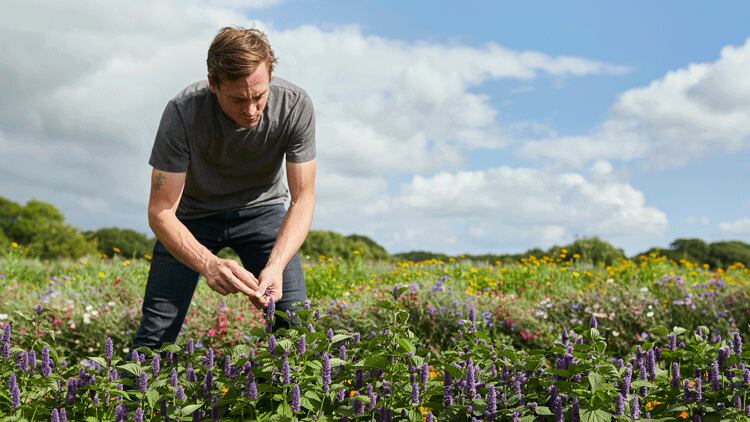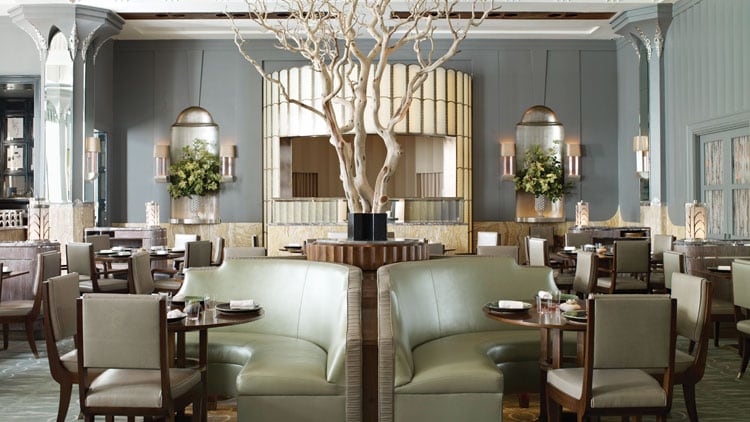Why did you decide to make the switch from high-end cooking to growing vegetables?
As a chef I became obsessed with incredible produce. As part of my Roux Scholarship I did a stage at Can Fabes (a Spanish three Michelin star restaurant), which opened my eyes to how good produce can be. At the time great produce was far harder to come by in London that it is now. The produce that the restaurant had access to was simply at another level. Upon returning to the UK I started working for Simon Rogan. We were on the same page about produce (the L’Enclume chef had a similar revelation while dining at Marc Veyrat’s flagship in Haute-Savoie, France). Simon was actually in an even worse situation because of where he was based. It was very difficult to find good fruit and vegetables in Cumbria back then. So we worked together to create a farm.
If a couple of chefs can do it with limited experience, why is it so hard for others to grow the produce chefs need?
It was a steep learning curve. But we knew what we wanted the end the result to be. We just needed to work out how to get there. The problem that chefs - and the world more generally - face is that 99% of agriculture and the wider supply chain is broken. Yields and profitability is valued above all else, and that leads to poor quality produce that damages the environment, not least the soil itself.
Explain the concept of soil health...
It’s very simple. If you look after the soil and feed it properly it will produce amazing products that are very high in nutrition. A lot of people still don’t realise that nutrition and flavour are the same thing. The reason that something is full of flavour is that it is full of nutrition. Those that farm intensively - and that is sadly the vast majority of farmers - aren’t looking after the health of their soil. A big part of the problem is how much food has been devalued. There’s an expectation that fruit and vegetables should always be cheap. The reason most fruit and vegetables are affordable is because they have been farmed in an inconsiderate way with soils that are inert and fed with chemical fertilisers. You are what you eat and you are what the thing you eat eats. I’d strongly recommend that all chefs watch Kiss The Ground (a Netflix documentary), that will tell you everything you need to know.
What’s the solution?
It’s very difficult. There are plenty of young, progressive people out there that want to change things but it’s very hard to get responsibly-run farms off the ground. The biggest barriers are access to land and money. The only way I’ve been able to get any traction is by working with Natoora, which already has a successful business and is looking to drive change through its Earthworks project.
How does the project work?
Natoora is aiming to regenerate the soil by establishing new farms across Europe and the US. My farm (Melilot in Cornwall) is the first of these. I took on the farm a few years ago but it soon became clear that I needed a partner if I was to have any hope of getting the word out about regenerative farming, not to mention finding a route to market. I know Franco (Fubini, Natoora’s founder) well so we decided to join forces. Natoora Earthworks provides a viable alternative to intensive farming that has the potential to mitigate climate change through carbon sequestration.
Why did you take a break from restaurants after Fera closed?
At Fera we were mainly using the produce from the farm in Cumbria. I knew where everything had come from and how it was grown. When I started looking at doing my own thing I realised that there was a limited amount of produce available for the level that I wanted to cook at. I thought ‘what’s the point of opening a restaurant if I can’t get the products that I need all of the time?’. I wanted to do something to change the system and improve what is available to chefs. Everybody deserves access to this kind of produce. I also want to educate chefs about soil health because it's incredibly important. I find that when you boil it down to being about nutrition and flavour it’s quite easy for them to understand. Restaurants and chefs I’m currently supplying include Super 8 (Kiln, Smoking Goat, Brat) and Jeremy Chan at Ikoyi. We’re also supplying locals directly.
What are you growing?
We’re doing a lot of crop tests and trials at the moment. We’re focusing on the things that work really well on the farm. Flowering artichokes - for example - are symbolic of everything I’ve tried to do here. They are a perennial plant, meaning that they come back every year, and they only give you a good product if you understand the soil in which they’re grown. We grow four or five other species of plant alongside to promote a diverse environment and we work the waste from the plant back into the soil to feed it and keep it healthy. When soil health is optimised the product looks better and tastes better. There’s more depth of flavour and intensity but sweetness is the main thing. There’s a strong link between sweetness and the amount of nutrition that’s in the plant.
Are you still planning to open a restaurant at Melilot?
100%. That’s what I came here to do. But I need to make this farm work first. I’m not in a great rush and we’ll build up slowly with small events. There's unlikely to be a big launch, it will happen organically. I’ve had a lot of time to think about what sort of experience I want to offer. It’s going to be something that takes place all over the farm. I want people to really see what’s going on and to be part of it.



